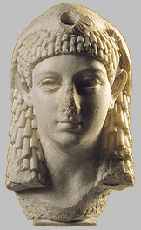|
The
books tell us how Cleopatra supposedly
died. They say that she committed
suicide by placing a poisonous snake on her body and let it kill her. In
Alexandria, there
are no memories left of Cleopatra's
life. All of the monuments and palaces remain at the bottom of the sea
in pieces. So now
we must ask: did Cleopatra really
kill herself? If not, then how did she really die? To find out, we must
start by studying
her past.
Egypt's final queen lived
and died in Alexandria. She was born in 69 B.C. and was a descendant
of a long line of Masedonian Greek
royalty. Her family ruled Egypt for over three centuries. As a child,
Cleopatra had an
excellent education and spoke 7
languages. At nurseries she learned about the other realities of royal
life. She lived
with her mother, father, brother and
sister. Being a spoiled child, she realised that she could get anything
she wanted. There
was no history of suicide in her
family, but there was a history of murder. Cleopatra stopped at nothing
to get her own
way, so does she really seem like
the type of person who would just give up?
At age 18, Cleopatra
inherited the throne of Egypt and married her 10-year-old brother. When
he challenged her power, he was soon
discovered dead. There was a similar fate for her other siblings. After
her
siblings' deaths, she feared that
she too would be murdered, so she courted the power of the Roman Empire.
She was Julius
Caesar's lover and gave birth to his
son. After Caesar's sudden death, she seduced his friend Mark Antony.

Now, let's try to figure out if it was possible for Cleopatra to have died from a snake bite...
|
 |
Architects
were able to figure out approximately where her moseleum and other
buildings would have been located at the
time. Cleopatra's moseleum was very
close to a palace where Octavian was lodged (only several hundred meters
apart). The story
is that Cleopatra was inside her
moseleum when she wrote out a suicide note for her guard to deliver to
Octavian. The guard
delived the note to Octavian. Then
she was poisoned by the snake and died. There are many reasons why this
can not be true.
For one, it would have taken the
guard only a few minutes to walk from the moseleum to the palace with
the suicide note, and
then back to the moseleum. Also, the
poisoning would have taken a couple of hours to kill Cleopatra! The
chances
of her dying from the snake bite
were very slim. Usually only 50% of poisoning (venum) is injected into a
victim by a snake.
So, this couldn't possibly be how
Cleopatra died.
In the Temple of Filé,
there is a carving of
Isis surrounded by a snake. This
carving has a connection to Cleopatra. She was believed to be the living
reincarnation of
Isis, and that her destiny was
intwined with the serpent.

One person who could have killed Cleopatra is Octavian. His plan was to
gain sole power. He
controlled the western Roman Empire
and Mark Antony controlled the east. Octavian then decided to declare
war, using Cleopatra
as a pawn. He thought his idea was
brilliant, for he was trying to capture Cleopatra. It is said that he
wanted to capture
her alive so that he could humiliate
her. After defeating Cleopatra, he became the first emperor of a new
era and he changed
his name to Augustus. Since he wrote
his own memoirs, Augustus might have been stretching the truth or even
lying about some
of the events that occured. Augustus
then saw Cleopatra's son, Cizarian, as a threat to Rome. Days before
Augustus arrived
in Alexandria, Cleopatra sent her
14-year-old son to Ethiopia. Eventually he was hunted down and killed.
A new theory is that
Augustus sent his guards to kill Cleopatra after killing her son.
Augustus hoped
that by having sole control of the
Roman Empire, he would be remembered by people long after his death.
Ironically, Cleopatra
is the one who is remembered...not
Augustus.
|
No comments:
Post a Comment